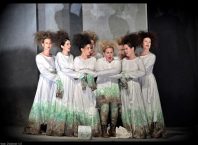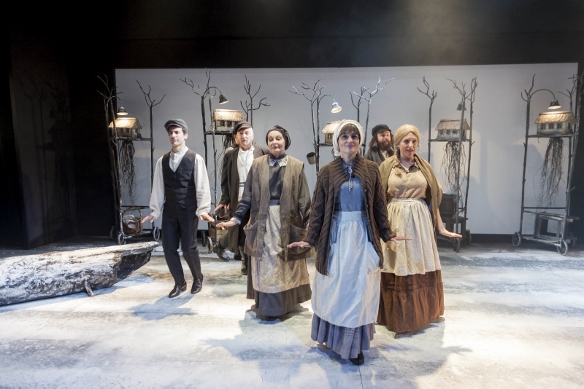
Foolish Tales is a musical comedy based on the stories of Yitskhok Leybush Peretz, known as Y. L. Peretz, (also known as Isaac Leib Peretz, I. L. Peretz). Written and directed by Aya Kaplan, with music and dramaturgy by Dori Parnes, the Yiddishpiel production is a lively and entertaining musical revue, that shines with the presence of two luminaries: Y. L. Peretz and Yaacov Bodo.
Yaacov Bodo’s stage presence is the embodiment of Yiddish humor. Yiddish humor has an elusive quality, that somehow defies description. Yes, it’s the colorful imagery, and it’s the laughter rising amidst tears, but as someone who grew up having her grandparents literally tell her quite often “it sounds better in Yiddish,” I can’t help but feel that there is something that eludes definitions, one of those I-know-it-when-I-see-it things. Bodo has it.
Foolish Tales is structured like a musical revue, with songs, stories and Bodo appearing between the different scenes, sharing a joke with the audience. Bodo’s delivery feels effortless and natural, almost as if he just happened to be passing by and a story came to mind that he wanted to share. As if the theatre were a street corner gathering of neighbors, friends meeting at the local pub, or travelers sharing a table one night at a roadside inn. Bodo is, in effect, the host of this evening, and he performs this task with wry humor and a mischievous charm.
Bodo opens the show announcing that it will tell of the lives of Jews in the Shtetl in Europe, stories from the past, and yet, reminds his audience that life and people today are “not so different.” The costumes reference the period, with the women in long skirts and kerchiefs, and the men in vests, caps and coats. The set design is evocative and beautiful, as small houses are mounted on a thin narrow frame with wheels that culminates in branches, like winter trees, while a tangle of roots hangs down below the houses. Capturing the sense of distance from that time and place, and creating the feeling of a different landscape – both emotional and physical, the minimalist and eloquent set, designed by Lili Ben-Nahson, is a work of art unto itself.
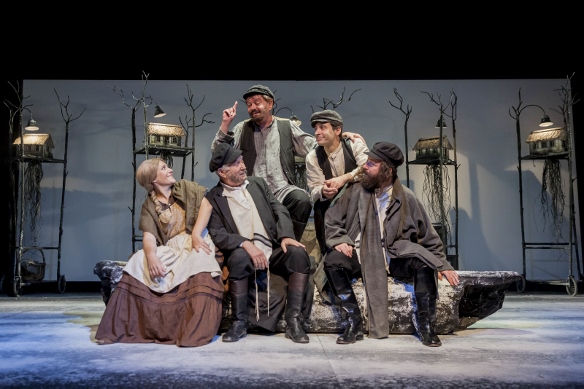
Y. L. Peretz is considered, along with Mendele Mocher Sfarim and Sholem Aleichem, as one of the three masters of Yiddish Literature. There is a certain challenge in presenting these stories, that describe a culture of a bygone era, and a certain responsibility to that culture and community that no longer exists. Framing the stories in a musical show, placing an emphasis on music, movement, and humor, serves to lighten the mood, despite the hard-scrabble lives of these protagonists. My one caveat is that at times it feels that play is trying too hard to entertain, with a certain exuberance at risk of obscuring the nuances of the tale.
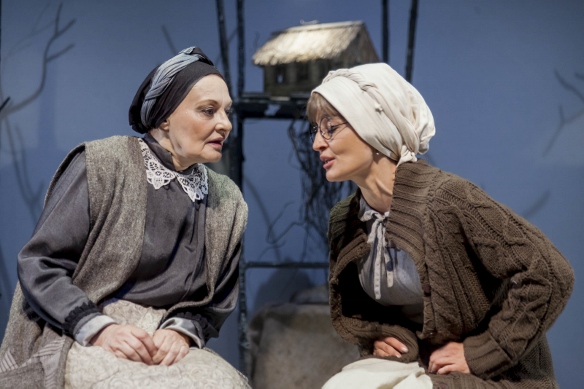
Although for contemporary audiences these stories are set firmly in the past, if one listens, it becomes apparent that Peretz was not interested in describing the poverty and piety of Jews for the sake of sentimentality or nostalgia. On the contrary, Peretz was looking forward, describing the present with a critical view, envisioning a different future. In this sense, his writing is critically relevant to contemporary audiences, as may be seen in two of my favorite stories in Foolish Tales, both relating to the status of women. In the first, one woman chastises her neighbor Grunya for not keeping a close enough watch on the morals of her daughter. Grunya’s response to this lecture is surprising and rather radical – no spoilers here, watch it and judge for yourselves. In the other story, Chaim the porter and his wife are money-poor but rich in love. There is a very funny scene in which Chaim and the other men are listening to the teacher’s sermons, half-asleep, then jumping up wide-eyes when his talk turns to Olam Haba – the World to Come – and the distinct requirements of entry to Gan Eden (paradise) or Gehinom (its opposite). Once more, rather than follow convention, or the voice of learned authority, Chaim thinks for himself, and the conclusion is sweet.
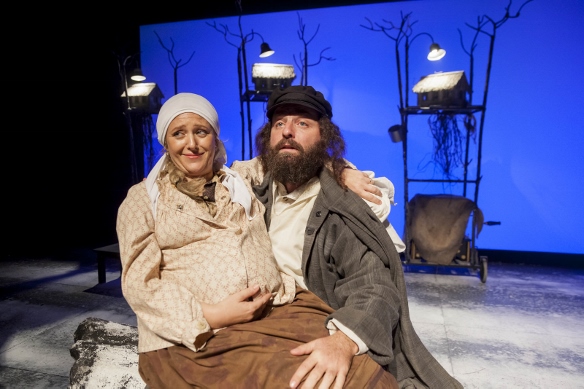
Foolish Tales
Based on the stories of Y. L. Peretz
Written and directed by Aya Kaplan; Dramaturgy, artistic and musical accompaniment: Dori Parnes; Costume design: Judit Aharon; Scenery design: Lili Ben-Nahshon; Choreography: Amit Zamir; Lighting design: Misha Chernyavsky; Simultaneous translation: Lora Sahar; Cast (alphabetical order): Tracy Abramovitz, Ronit Asheri, Yaacov Bodo, Israel Treistman, Irma Stepanov, Andrey Kashker, Jonathan Rozen, Yuval Rapaport.



